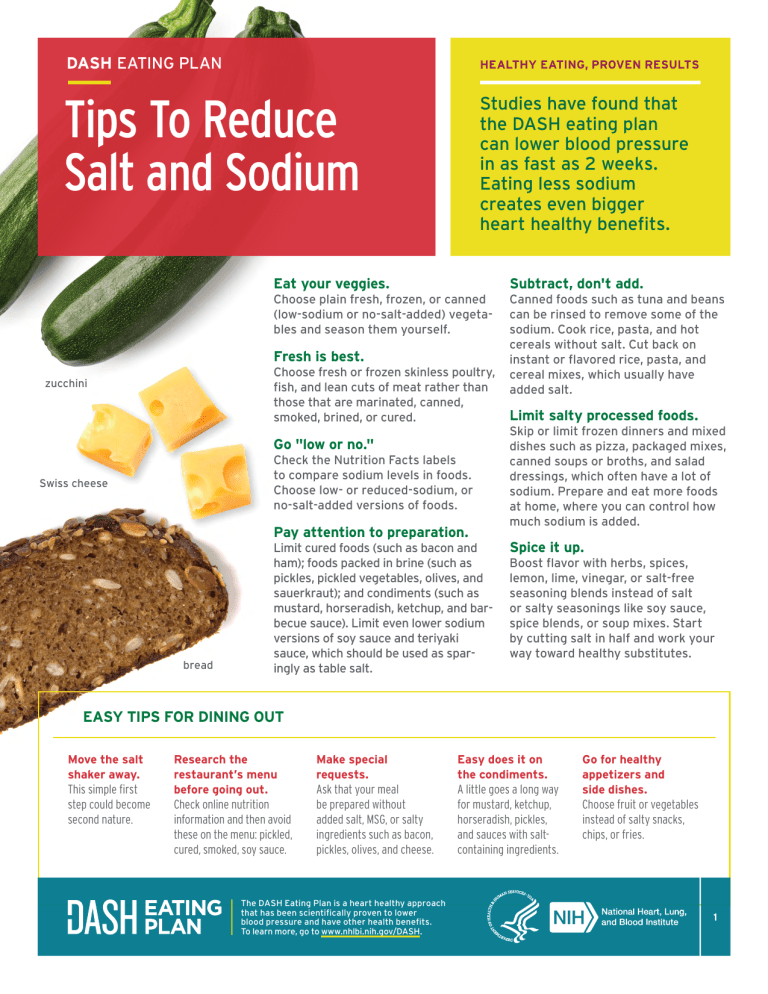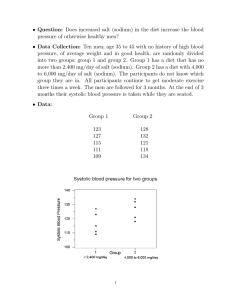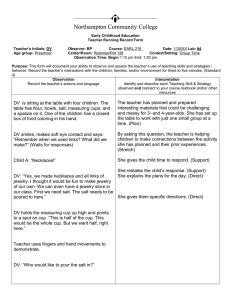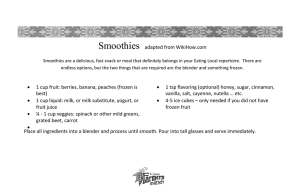
DASH EATING PLAN HEALTHY EATING, PROVEN RESULTS Tips To Reduce Salt and Sodium Studies have found that the DASH eating plan can lower blood pressure in as fast as 2 weeks. Eating less sodium creates even bigger heart healthy benefits. Eat your veggies. Subtract, don't add. Choose plain fresh, frozen, or canned (low-sodium or no-salt-added) vegetables and season them yourself. Canned foods such as tuna and beans can be rinsed to remove some of the sodium. Cook rice, pasta, and hot cereals without salt. Cut back on instant or flavored rice, pasta, and cereal mixes, which usually have added salt. Fresh is best. Choose fresh or frozen skinless poultry, fish, and lean cuts of meat rather than those that are marinated, canned, smoked, brined, or cured. zucchini Go "low or no." Check the Nutrition Facts labels to compare sodium levels in foods. Choose low- or reduced-sodium, or no-salt-added versions of foods. Swiss cheese Pay attention to preparation. bread Limit cured foods (such as bacon and ham); foods packed in brine (such as pickles, pickled vegetables, olives, and sauerkraut); and condiments (such as mustard, horseradish, ketchup, and barbecue sauce). Limit even lower sodium versions of soy sauce and teriyaki sauce, which should be used as sparingly as table salt. Limit salty processed foods. Skip or limit frozen dinners and mixed dishes such as pizza, packaged mixes, canned soups or broths, and salad dressings, which often have a lot of sodium. Prepare and eat more foods at home, where you can control how much sodium is added. Spice it up. Boost flavor with herbs, spices, lemon, lime, vinegar, or salt-free seasoning blends instead of salt or salty seasonings like soy sauce, spice blends, or soup mixes. Start by cutting salt in half and work your way toward healthy substitutes. EASY TIPS FOR DINING OUT Move the salt shaker away. This simple first step could become second nature. Research the restaurant’s menu before going out. Check online nutrition information and then avoid these on the menu: pickled, cured, smoked, soy sauce. Make special requests. Easy does it on the condiments. Ask that your meal be prepared without added salt, MSG, or salty ingredients such as bacon, pickles, olives, and cheese. A little goes a long way for mustard, ketchup, horseradish, pickles, and sauces with saltcontaining ingredients. The DASH Eating Plan is a heart healthy approach that has been scientifically proven to lower blood pressure and have other health benefits. To learn more, go to www.nhlbi.nih.gov/DASH. Go for healthy appetizers and side dishes. Choose fruit or vegetables instead of salty snacks, chips, or fries. 1 Where's the sodium? brown rice green beans Most of the sodium we eat comes from added salt in packaged or prepared foods. Only a small amount occurs naturally in foods. Check Nutrition Facts labels and choose foods with lower sodium levels. Grains Serving Size Milligrams of Sodium Cooked cereal, rice, pasta (unsalted) ½ cup Ready-to-eat packaged cereal ½ cup Bread 1 slice 0—15 0—360 120—210 Vegetables Fresh or frozen, cooked without salt ½ cup Canned or frozen with sauce ½ cup Pasta sauce, jarred ½ cup 0—70 190—430 270—490 Fruits Fresh, frozen, canned ½ cup 0—5 Dairy strawberries black-eyed peas Milk 1 cup 110 Yogurt 1 cup 85—190 Natural cheeses 1 ½ oz American cheese, processed 1 slice 90—480 200—240 Nuts, Seeds, and Legumes milk Nuts, unsalted ⅓ cup Nuts, salted Beans, cooked from dried or frozen (unsalted) Beans, canned ⅓ cup 0—5 70—260 ½ cup 0—10 ½ cup 130—450 Meats, Fish, and Poultry tuna Fresh or frozen meat, fish, poultry 3 oz Fresh or frozen poultry, with broth 3 oz Tuna, canned, water pack 3 oz Turkey breast, lunch meat 3 oz 540—810 Ham, lean, roasted 3 oz 920—950 55—75 100—170 140—180 0 The DASH Eating Plan is a heart healthy approach that has been scientifically proven to lower blood pressure and have other health benefits. To learn more, go to www.nhlbi.nih.gov/DASH. 100 200 300 400 500 2


